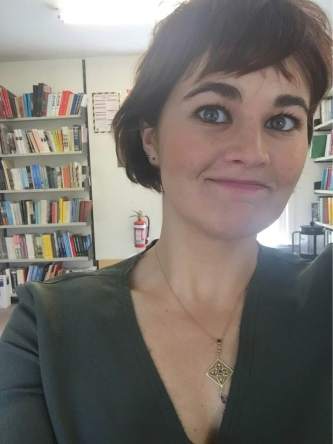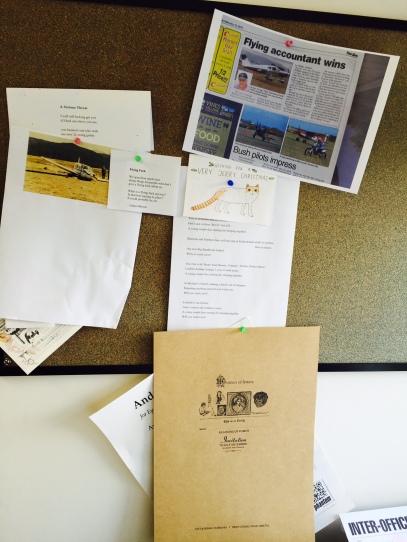A series of interviews with people about the work they do.
Ashleigh Young is a poet, essayist, teacher of science writing and editor at Victoria University Press. Her first collection of poems, Magnificent Moon, is magnificent. A collection of essays, Can You Tolerate This? is forthcoming in 2016. She also has a blog called eyelashroaming.

“I got the job and became this terrible editor who didn’t know anything.”
–Ashleigh Young
Interviewer
Does your job have title?
Ashleigh Young
Yes, I am an Editor at Victoria University Press (VUP). It feels nice to have a title. For half of the year I am also a Tutor in Science Writing, but that’s a whole other can of worms so I’m going to focus on my main day-to-day job.
Interviewer
Can you describe the things you do in your job?
Ashleigh Young
I work with a lot of writers to help them get their books ready to go out in the world. I edit books of poetry, short story collections, some nonfiction (mostly the memoir sort of nonfiction), and the odd novel. I’ve just finished editing Danyl McLauchlan’s second novel, Mysterious Mysteries of the Aro Valley, which was one of the most fun novels I’ve ever edited.
Alongside the editing I try to be supportive and encouraging, especially for first-time authors who are still getting their heads around the whole process. I like editing to be a conversation, a process of suggestion and refinement, rather than me tearing bits off someone’s work and scolding them for using too many adverbs or semicolons or whatever.
I typeset the books and sometimes help find a cover image or commission one from an illustrator. I write a few back-cover blurbs. I have a bit of a fixation with a good blurb. A well-done blurb is such a thing of beauty. My journey in blurbs is really only just beginning.
Also, roughly one-third of my job at VUP is giving editorial feedback to academics who have written research proposals to the Marsden Fund. That’s quite tough. It’s fast-paced and the applications – in all sorts of fields: biology, statistics, engineering, psychology – use highly technical language. It’s incredibly impressive, the kinds of projects people are doing. All I can do is try to make their proposals a little bit easier to read.
Interviewer
Do you get paid for doing this work?
Ashleigh Young
Yes. Thank god. After a few years of not having much money I am very, very grateful to be paid. A part of me still can’t quite believe it.
Interviewer
How did you get into editing?
Ashleigh Young
I started off doing some freelance writing for Learning Media while I was working as a shop girl at Dymocks Booksellers. I wrote little chapter books about Greek mythology and recycling and the solar system, that sort of thing. Kate De Goldi got me into that, because I’d done her Writing for Children course.
Then suddenly a job came up at Learning Media for Writer/Editor. So I went for it. I knew I could hack my way through the writing part of it. And I knew I had some kind of instinct for what worked in a sentence and in a story. But that’s all it was – instinct. I couldn’t explain any of it. And often my instincts were just wrong. Also, I had no idea how a publishing company worked. I didn’t know any of the proofreading marks. I didn’t even really know how to proof a text. Anyway, I got the job and became this terrible editor who didn’t know anything. An amazing editor called Simon Minto, who became a good friend, took me under his wing and taught me a lot.

“After a few years of not having much money I am very, very grateful to be paid.”
Interviewer
Do you feel that you can be your true self in this job or do you have to wear a suit of armour to do the work?
Ashleigh Young
My job at VUP is the first job I’ve felt I can be my true self, whatever that is, on the whole. It took a while to get used to. The time I have to put on the armour is at book launches and other literary events. If I am giving a speech I always wear so much armour you can practically hear me clanking about.
Interviewer
What is the strangest piece of work you’ve done in this job?
Ashleigh Young
I think it was working on Rachel Bush’s book Thought Horses. Rachel was in the last stages of a terminal illness. Knowing that this would be her last book – that maybe this phone call would be the last, or this email – it was a privilege at the same time as being very sad and unsettling. She died on the day that her book came back from the printer. A week before that, we sent her a bound proof, so at least she was able to see her book.
Interviewer
What do you like most about editing?
Ashleigh Young
I love reading a manuscript and getting excited about it because I know it’s really good. I know when it’s good because I get a tingly feeling (that’s science). Also, I really enjoy my conversations with writers over email and even in tracked changes in MS Word. It’s the perfect way for an introvert to have conversations.
Interviewer
And what’s the worst part?
Ashleigh Young
Riding up the hill to work. The roads leading to the university are narrow and busy and a lot of drivers are impatient. I also hate how long it takes me to stop sweating and cool down once I reach my desk. I drip sweat all over my desk and the carpet. It’s just not very professional.
“Verbification has been useful to English for centuries – we wouldn’t have verbs like ‘mail’, ‘ship’, or ‘rain’ without it.”
Interviewer
When you were seven years old what did you want to be?
Ashleigh Young
A famous pianist and singer like Elton John.
Interviewer
Do you encounter prejudiced attitudes very much in your work?
Interviewer
Very rarely. Just occasionally, I get the feeling that some older people in the literary world don’t quite trust a younger person with their work – that they don’t really take me seriously. Then again, I’m quite a paranoid person.
Interviewer
What are the people like that you work with?
Ashleigh Young
They’re a dream team.
Interviewer
What sort of clothes and shoes to you wear at work?
Ashleigh Young
There’s no real dress code here (or, I’ve been operating on the assumption that there isn’t). I love nice clothes but I also like being comfortable, so often I just wear my old faithful denim skirt and a shirt. Lots of cardigans. Lately I’ve taken to shining my shoes, which I think gives me a certain edge over other people in the office. Sometimes my clothes look odd because I’ve put them in my bike pannier the night before and haven’t thought the outfit through. Also, unfortunately my coworkers often see me in my running or cycling gear. For book launches I try to get dressed up a bit and wear a nice frock.

“Lately I’ve taken to shining my shoes, which I think gives me a certain edge over other people in the office.”
Interviewer
If you didn’t have to work for money, what would you do with your time?
Ashleigh Young
I’d keep hanging around the office until they told me to leave. Then I would immediately find some way to structure my time otherwise I would go crazy. I’d help out at the SPCA. I’d tutor English. I’d dig vegetable gardens. Basically, I’d try to help others in a more fundamental way. I would also learn how to cook properly and how to do proper bike maintenance. I might even learn how to drive a car. There are so many grown-up things I haven’t learnt how to do yet. I need to go to some kind of finishing school.
Interviewer
What’s your star sign?
Ashleigh Young
Cancer. I’m textbook: the hard shell, the sensitive innards.
Interviewer
Pride and Prejudice – the movie, TV series or the book?
Ashleigh Young
The book. Also, there’s this essay by Helen Garner about reading Pride and Prejudice. I liked that a lot more than Pride and Prejudice itself.
Interviewer
What’s in that cupboard?

Ashleigh Young
We keep our Poet in Residence in there.
Interviewer
Do you have a word that you really don’t like people using in writing?
Ashleigh Young
I don’t like it when people say ‘a female’ instead of a girl, woman, or lady. In certain contexts it’s oddly dehumanising, sort of clinical. I also dislike the word ‘drool’, but people like Danyl [McLauchlan] insist on using it.
Interviewer
What is one of the common mistakes people make in writing English (apart from misuse of apostrophes)?
Ashleigh Young
They’re all kind of boring. Affect/effect, overcorrection of ‘anymore’, misspelling of place names.
This is slightly different but one big mistake, I think, is lording it over others when a mistake is spotted. ‘Look at this hilariously wrong apostrophe on this sign, by some idiot signwriter who doesn’t know anything’, sort of thing. It’s tedious and snobbish. These tend to be the same people who start hand-wringing when new forms become accepted into English usage.
One argument that’s been going on for a while is around verbification – i.e. when a noun becomes a verb, such as to favourite, to bookmark, to friend. (A lot of new-ish verbs are coming from the internet.) I hear people say that these new verbs are ugly, that they aren’t proper English. But verbification has been useful to English for centuries – we wouldn’t have verbs like ‘mail’, ‘ship’, or ‘rain’ without it. English has always been a mongrel of a language that thrives on openness and change. That’s not to say I fully embrace all new verbs, like some of the ones you see in the corporate world, like ‘solutioning’ or ‘actioning’. I also recently saw ‘food’ used as a verb, like, ‘The fooding area’. The fooding area! Actually, maybe that one is acceptable because it’s funny. I just struggle with new words that seem designed to make a person or company look cleverer than they really are.
April 2016, interview by The Invisible Writer

I loved reading this piece about Ashleigh and her work. The questions were so eloquently answered I didn’t want the interview to end. Looking forward to the next instalment in this new blog and can’t wait for Ashleigh’s book launch.
Thanks Janet! I think Ashleigh’s book will be launched in early August – I’ll let you know the date well in advance!
Great interview! Also, I’m surprised and stoked to see the ‘Women of Letters’ poster that Erin and I made is pinned up somewhere in Ashleigh’s office/environs. ‘Magnificent Moon’ is, indeed, magnificent and I can’t wait for her collection of essays.
Thanks Ya-Wen – great poster also!
[…] For the complete interview see here […]
[…] As well as being an editor Ashleigh also writes poetry and essays, and co-teaches science writing at the IIML. Her first book was Magnificent Moon (VUP, 2012) and she has a collection of essays, Can You Tolerate This? forthcoming in 2016. She also writes beautiful essay-like posts about ‘memory, mental health, cycling, and inconsequential things’ on her blog eyelashroaming.com. You can read a great interview with Ashleigh as part of the What Do People Do All Day? series. […]